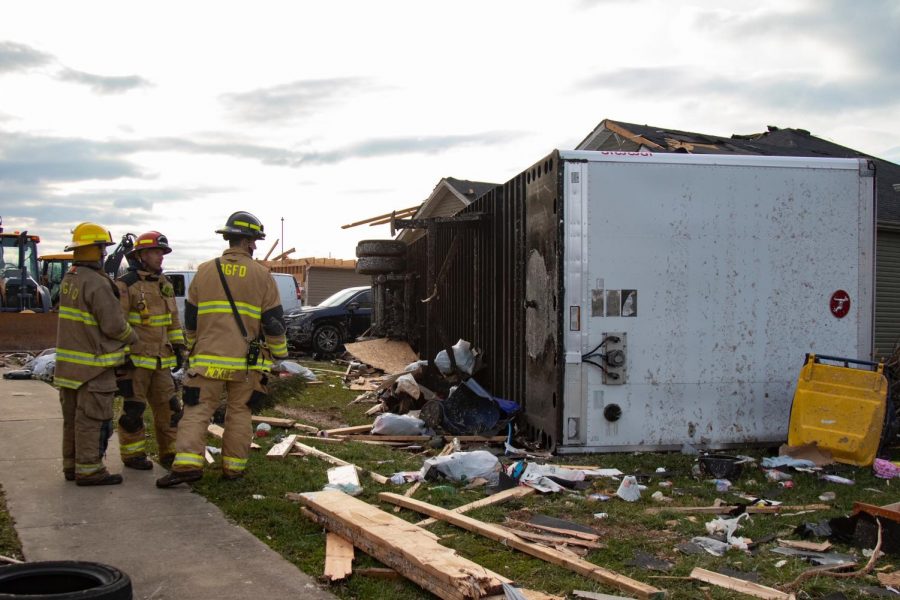‘I got to come out of this’: Project Recovery working to heal tornado trauma
Members of the Bowling Green Fire Department discuss clean up efforts of a tractor trailer that was tipped over during the tornadoes on Saturday Dec. 11, 2021.
September 16, 2022
Janet Elliot lost almost everything in Bowling Green’s December 2021 tornadoes. A twister took the roof off of her townhouse, some of the walls upstairs and even her vehicle.
Elliot started to slip into a dark place after the event. She said she knew she needed help when she started to push people away.
“When I realized I started to push my best friend away, she got concerned,” Elliot said. “It’s like, ‘I got to come out of this’.”
She started journaling to help herself, and then started searching for local tornado support groups. She found LifeSkills by calling 211, the number for Essential Community Services, and was connected with Bowling Green native Tyler Heckman.
The pair got to talking and formed Project Recovery together.
Project Recovery is a support group for those affected by Bowling Green’s December tornadoes, continuing to support victims by providing crisis counseling and meetings twice a month.
Heckman, manager of the program, wanted to help his hometown community. The program is more than just a support group – it also provides in-home counseling to those who need it, attempting to break mental health stigmas by reaching people where they are.
The program is funded by a federal grant that is being distributed locally. Project Recovery started in May and will continue onwards if there is a need or if funding remains available.
LifeSkills is the parent organization for Project Recovery and if funding is lost, people will still be able to receive help from LifeSkills.
Project Recovery helps people through all stages of recovering from a traumatic experience. Heckman said people will hit different places in the trauma recovery process, practical and psychological, at different times.
“A lot of that is tied to the practical situation,” Heckman said. “I think a lot of people don’t realize how many are still in temporary housing right now.”
Project Recovery was made to help people where they are, instead of expecting them to hit what other people may view as the “right” stages at the “right” times.
Heckman has been very supportive of Elliot and does not allow her to downplay her successes. He describes her as a success story and credits her for helping other people even while she is growing and dealing with her own trauma.
Heckman said the city of Bowling Green has helped the group reach victims and has allowed them to advertise their program.
“Credit to just the city of Bowling Green, I’ve seen almost no pushback from anybody,” Heckman said. “When I ask like, ‘Can you put this out?’ Everybody’s onboard with doing their part to help.”
People can get involved with the support group by attending their public meetings at the Warren County Public Library main campus on every second and fourth Tuesday of the month. Project Recovery’s next meeting is set for Sept. 29.
News reporter B Turner can be reached at [email protected].













